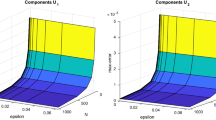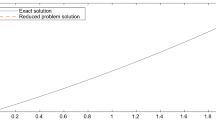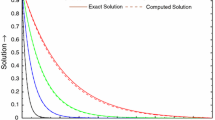Abstract
In this article, a singular perturbation delay problem of convection–diffusion (C–D) type having an integral boundary condition is considered. The analytical solution of the considered problem has a weak interior layer in addition to the boundary layer at the right end of the domain. Some a priori estimates are given on the exact solution which are useful for the error analysis. The numerical approximation is composed of a hybrid finite difference scheme on a generalized Shishkin mesh. For the proposed scheme, almost second order \(\varepsilon \)-uniform convergence is established. Numerical experiments are conducted to corroborate the theoretical results. A comparison with the existing scheme (J Appl Math Comput 63:813–828) is also performed.


Similar content being viewed by others
References
Almomani, R., Almefleh, H.: On heat conduction problem with integral boundary condition. J. Emerg. Trends Eng. Appl. Sci. 3, 977–979 (2012)
Bahuguna, D., Abbas, S., Dabas, J.: Partial functional differential equation with an integral boundary condition and applications to population dynamics. Nonlinear Anal. 69, 2623–2635 (2008)
Cannon, J.R.: The solution of the heat equation subject to the specification of energy. Q. Appl. Math. 21, 155–160 (1963)
Choi, Y.S., Chan, K.Y.: A parabolic equation with nonlocal boundary conditions arising from electrochemistry. Nonlinear Anal. Theory Methods Appl. 18(4), 317–331 (1992)
Cahlon, B., Kulkarni, D.M., Shi, P.: Stepwise stability for the heat equation with a nonlocal constraint. SIAM J. Numer. Anal. 32, 571–593 (1995)
Formaggia, L., Nobil, F., Quarteroni, A., Venezian, A.: Multiscale modelling of the circulatory system: a preliminary analysis. Comput. Vis. Sci. 2, 75–83 (1999)
Jankowskii, T.: Differential equations with integral boundary conditions. J. Comput. Appl. Math. 147, 1–8 (2002)
Hu, M., Wang, L.: Triple positive solutions for an impulsive dynamic equation with integral boundary condition on time scales. Int. J. Appl. Math. Stat. 31, 43–66 (2013)
Turkyilmazoglu, M.: Parabolic partial differential equations with nonlocal initial and boundary values. Int. J. Comput. Methods 12(5), 1550024 (2015)
Ashyralyev, A., Sharifov, Y.A.: Existence and uniqueness of solutions for nonlinear impulsive differential equations with two-point and integral boundary conditions. Adv. Differ. Equ. 173, 1–11 (2013)
Bahuguna, D., Dabas, J.: Existence and uniqueness of a solution to a semilinear partial delay differential equation with an integral condition. Nonlinear Dyn. Syst. Theory 8, 7–19 (2008)
Boucherif, A.: Second order boundary value problems with integral boundary condition. Nonlinear Anal. 70, 368–379 (2009)
Li, H., Sun, F.: Existence of solutions for integral boundary value problems of second order ordinary differential equations. Bound. Value Probl. 2012(1), 147 (2012)
Elsgolts, E.L.: Qualitative Methods in Mathematical Analysis in: Translations of Mathematical Monographs, vol. 12. American Mathematical Society, Providence (1964)
Culshaw, R.V., Ruan, S.: A delay differential equation model of HIV infection of \(CD4^{+}\) T-cells. Math. Biosci. 165, 27–39 (2000)
Glizer, V.Y.: Asymptotic analysis and solution of a finite-horizon \(H_\infty \) control problem for singularly perturbed linear systems with small state delay. J. Optim. Theory Appl. 117, 295–325 (2003)
Longtin, A., Milton, J.: Complex oscillations in the human pupil light reflex with mixed and delayed feedback. Math. Biosci. 90, 183–199 (1988)
Doolan, E.P., Miller, J.J.H., Schilders, W.H.A.: Uniform Numerical Methods for Problems with Initial and Boundary Layers. Boole Press, Dublin (1980)
Farrell, P.A., Hegarty, A.F., Miller, J.J.H., O’Riordan, E., Shishkin, G.I.: Robust Computational Techniques for Boundary Layers. Chapman-Hall, Boca Raton (2000)
Miller, J.J.H., O’Riordan, E., Shishkin, G.I.: Fitted Numerical Methods for Singular Perturbation Problems. World Scientific Publishing Co., Singapore (1996)
Roos, H.G., Stynes, M., Tobiska, L.: Numerical Methods for Singularly Perturbed Differential Equations, Convection–Diffusion and Flow Problems. Springer, Berlin (1996)
Kadalbajoo, M.K., Patidar, K.C.: Parameter-uniform fitted mesh method for singularly perturbed delay differential equations with layer behavior. Electron. Trans. Numer. Anal. 23, 180–201 (2006)
Kadalbajoo, M.K., Sharma, K.K.: Numerical treatment of boundary value problems for second order singularly perturbed delay differential equations. Comput. Appl. Math. 24, 151–172 (2005)
Lange, C.G., Miura, R.M.: Singular perturbation analysis of boundary value problems for differential-difference equations. SIAM J. Appl. Math. 42(3), 502–530 (1982)
Nicaise, S., Xenophontos, C.: Robust approximation of singularly perturbed delay differential equations by the hp finite element method. Comput. Methods Appl. Math. 13, 21–37 (2013)
Zarin, H.: On discontinuous Galerkin finite element method for singularly perturbed delay differential equations. Appl. Math. Lett. 38, 27–32 (2014)
Turkyilmazoglu, M.: Analytic approximate solutions of parameterized unperturbed and singularly perturbed boundary value problems. Appl. Math. Model. 35, 3879–3886 (2011)
Amiraliyev, G.M., Amiraliyev, I.G., Kuddu, M.: A numerical treatment for singularly perturbed differential equations with integral boundary condition. Appl. Math. Comput. 185, 574–582 (2007)
Cakir, M., Amiraliyev, G.M.: A finite difference method for the singularly perturbed problem with nonlocal boundary condition. Appl. Math. Comput. 160, 539–549 (2005)
Cen, Z., Cai, X.: A second order upwind difference scheme for a singularly perturbed problem with integral boundary condition in neutral network. In: 11th International Conference, KES 2007. XVII Italian Workshop on Neural Networks, Vietri sul Mare, Italy, Proceedings, vol. 2, pp. 175–181 (2007)
Kudu, M., Amiraliyev, G.: Finite difference method for a singularly perturbed differential equations with integral boundary condition. Int. J. Math. Comput. 26, 72–79 (2015)
Kumar, D., Kumari, P.: A parameter-uniform collocation scheme for singularly perturbed delay problems with integral boundary condition. J. Appl. Math. Comput. 63, 813–828 (2020)
Sekar, E., Tamilselvan, A.: Singularly perturbed delay differential equations of convection–diffusion type with integral boundary condition. J. Appl. Math. Comput. 59(1), 701–722 (2020)
Farrell, P.A., Hegarty, A.F., Miller, J.J.H., O’Riordan, E., Shishkin, G.I.: Singularly perturbed convection–diffusion problems with boundary and weak interior layers. J. Comput. Appl. Math. 166(1), 133–151 (2004)
Mukherjee, K., Natesan, S.: Parameter-uniform hybrid numerical scheme for time-dependent convection-dominated initial-boundary-value problems. Computing 84(3–4), 209–230 (2009)
Mukherjee, K., Natesan, S.: \(\varepsilon \)-uniform error estimate of hybrid numerical scheme for singularly perturbed parabolic problems with interior layers. Numer. Algorithms 58(1), 103–141 (2011)
Stynes, M., Roos, H.G.: The midpoint upwind scheme. Appl. Numer. Math. 23(3), 361–374 (1997)
Majumdar, A., Natesan, S.: An \(\varepsilon \)-uniform hybrid scheme for a singularly perturbed degenerate convection–diffusion problem. Int. J. Comput. Math. 96(7), 1313–1334 (2018)
Gupta, V., Kumar, M., Kumar, S.: Higher order numerical approximation for time dependent singularly perturbed differential-difference convection–diffusion equations. Numer. Methods Partial Differ. Equ. 34, 357–380 (2018)
Majumdar, A., Natesan, S.: A higher-order hybrid numerical scheme for singularly perturbed convection-diffusion problem with boundary and weak interior layers. Int. J. Math. Model. Numer. Optim. 10(1), 68–101 (2020)
Author information
Authors and Affiliations
Corresponding author
Additional information
Publisher's Note
Springer Nature remains neutral with regard to jurisdictional claims in published maps and institutional affiliations.
Appendices
Appendix
Some properties of the barrier function \(\phi _{i}(m)\).
Lemma A.1
For \(0< m < r^{*}/2\), the following inequalities hold
Proof
Using the barrier function defined in Eq. (4.3), we obtain
We now apply the operator \({\mathcal {L}}_\varepsilon ^M\) on \(\phi _{i}(m)\) for \( i=1,\ldots ,M/4\) to obtain
Again, for \( i=M/4+1,\ldots ,M/2\), we have
It is easy to obtain that
Now, applying the discrete operator \({\mathcal {L}}_\varepsilon ^M\) on \(\phi _{i}(m)\) for \(i= M/2+1,\ldots ,3M/4\), we obtain
Again, for \(i=3M/4+1,\ldots ,M-1\), we have
\(\square \)
Lemma A.2
For each i and \(0<m<r^{*}/2\), the mesh function \(\phi _{i}(m)\) satisfies
and
Proof
We have,
Multiplying the above inequalities for \(j= i+1,\ldots , M/2\), we obtain
or,
\(\square \)
Lemma A.3
For \(0<m<r^{*}/2\), the following inequalities hold true
and
Proof
For \(M/4 \le i \le M/2\), we have
Using \(e^{-L}\le L/M\), we get
Using similar arguments, we get the desired inequality for \(3M/4\le i \le M-1\). \(\square \)
Rights and permissions
About this article
Cite this article
Sharma, A., Rai, P. A hybrid numerical scheme for singular perturbation delay problems with integral boundary condition. J. Appl. Math. Comput. 68, 3445–3472 (2022). https://doi.org/10.1007/s12190-021-01667-x
Received:
Revised:
Accepted:
Published:
Issue Date:
DOI: https://doi.org/10.1007/s12190-021-01667-x
Keywords
- Delay differential equation
- Integral boundary condition
- Singular perturbation
- Hybrid scheme
- Generalized Shishkin mesh




